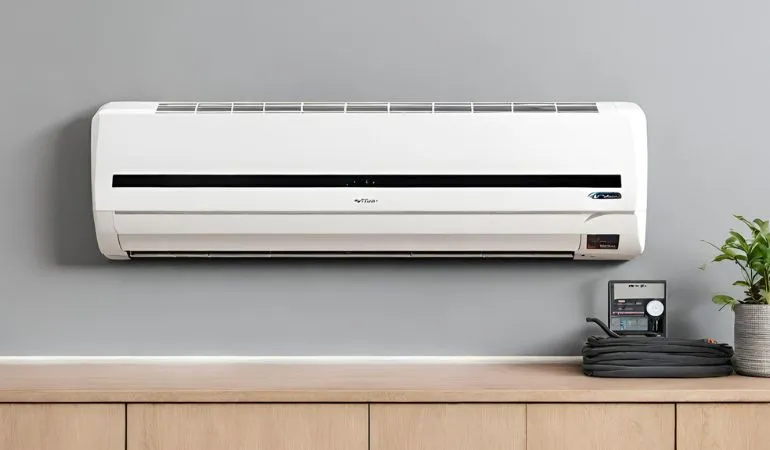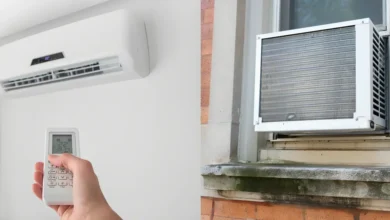Inverter AC vs. Non-Inverter AC: Which One to Choose?

Embarking on the journey of selecting the ideal air conditioning system involves a pivotal decision: Inverter ACs, Non-Inverter ACs, or perhaps the specific cooling prowess of a 2 Ton Inverter AC? Both Inverter and Non-Inverter ACs promise to cool your spaces, yet their inner workings and performance diverge significantly.
Let’s delve into the nuances, advantages, and disadvantages, empowering you to make a choice tailored to your unique needs.”
Inverter AC vs Non Inverter AC
Choosing between Inverter and Non-Inverter ACs? Dive into our concise comparison to unravel the nuances. Discover efficiency, cost considerations, and who each type suits best. Your shortcut to making an informed decision find best AC in India 2024.
| Aspect | Inverter AC | Non-Inverter AC |
|---|---|---|
| Working Principle | Employs variable-speed compressors for flexibility | Follows a straightforward on/off pattern |
| Energy Efficiency | Orchestrates variable speeds for energy efficiency | Operates with constant on/off cycles, higher energy consumption |
| Cooling Performance | Swift and seamless cooling with variable technology | May take time to cool, occasional temperature fluctuations |
| Noise Level | Operates with hushed elegance, minimal disruptions | Can be louder, especially during startup |
| Cost Considerations | Higher initial investment but long-term savings | More budget-friendly upfront, higher operational costs over time |
| Advantages | Efficiency maestro, precise temperature control | Budget harmony, simpler maintenance and repair |
| Disadvantages | Higher upfront cost, potential repair expenses | Higher energy consumption, occasional temperature challenges |
| Suitable For | – Those craving efficiency and long-term savings | – Budget-conscious consumers prioritizing upfront affordability |
| – Individuals valuing precise temperature control | – Ideal for spaces with sporadic AC use or limited square footage | |
| – Environments where the AC is a constant companion | – Environments where noise levels take a backstage role in the cooling performance |
Comprehensive Analysis of Inverter and Non-Inverter AC Technologies
1. The Pulsating Heart: Working Principle
- Inverter AC: Envision a dance of flexibility – Inverter ACs employ variable-speed compressors, adapting their pace to cooling demands. This not only ensures precision but also elevates energy efficiency by avoiding the rigid on/off rhythm.
- Non-Inverter AC: Simplicity reigns supreme – Non-Inverter ACs follow a straightforward on/off pattern, utilizing fixed-speed compressors. However, the downside lies in frequent start-stop cycles that can lead to energy wastage.
2. The Energy Ballet: Efficiency Unleashed
- Inverter AC: Like a seasoned conductor, the Inverter AC orchestrates a symphony of variable speeds, curbing unnecessary energy consumption. Consequently, this translates to a consistent temperature without the financial strain.
- Non-Inverter AC: Imagine a basic toggle switch – Non-Inverter ACs operate with constant on/off cycles, sipping more electricity. Consequently, this can result in temperature fluctuations and higher monthly bills.
3. Cooling Choreography: Performance Unveiled
- Inverter AC: Think of it as a graceful waltz – Inverter technology allows for swift and seamless cooling. It swiftly reaches the desired temperature and holds the fort, ensuring comfort without the drama.
- Non-Inverter AC: Picture a slow waltz – Non-Inverter ACs may take their time to cool a room. Maintaining a stable temperature? Sometimes a challenge, leading to occasional discomfort.
4. Sonic Serenity: The Noise Dilemma
- Inverter AC: Embrace the tranquility – Inverter ACs, with their variable-speed prowess, operate with hushed elegance. Consequently, say goodbye to abrupt noise disturbances during both active and idle phases.
- Non-Inverter AC: Brace for impact – Non-Inverter ACs might be a tad louder, especially during startup. Consequently, the frequent on/off cycles contribute to the acoustic narrative.
5. The Economic Opera: Cost Considerations
- Inverter AC: A virtuoso performance comes at a price – Inverter ACs often command a higher initial investment. However, this upfront cost paves the way for a financial crescendo through reduced energy consumption.
- Non-Inverter AC: The budget overture – Non-Inverter ACs take center stage with a more wallet-friendly entrance fee. Yet, beware, as the long-term operational costs may play a different tune.
Advantages and Disadvantages of Inverter and Non Inverter AC
Inverter AC:
Advantages:
- Efficiency Maestro: The variable-speed compressor orchestrates energy efficiency, conducting a symphony of precise cooling.
- Thermostat Virtuosity: Pinpoint temperature control ensures a consistently comfortable atmosphere, a hallmark of Inverter ACs.
- Whispering Breezes: Operating with serene quietness, Inverter ACs spare you from disruptive noise intrusions.
- Savings Sonata: Despite a higher ticket price, Inverter ACs compose a melody of long-term savings through reduced energy consumption.
Disadvantages:
- Pricey Performance: The upfront cost may sting a bit, reflecting the sophisticated technology within. Consequently, repair costs could join the ensemble if complications arise.
Non-Inverter AC:
Advantages:
- Budget Harmony: Making a pocket-friendly entrance, Non-Inverter ACs are ideal for those dancing to a budget-conscious tune.
- Techno-Simplicity: The straightforward on/off operation simplifies maintenance and repair, appealing to those who prefer a less intricate cooling cadence.
Disadvantages:
- Energy Consumption Crescendo: Consuming more energy with frequent on/off cycles, Non-Inverter ACs lead to higher operational costs over time.
- Temperature Tango: Non-Inverter ACs may struggle to maintain a consistent temperature, introducing occasional discomfort to the cooling choreography.
Choosing Your Cooling Symphony:
1. Inverter ACs for the Connoisseurs:
- For those craving efficiency and long-term savings.
- Individuals valuing precise temperature control and a peaceful cooling experience.
- Environments where the AC is a constant companion, working tirelessly for extended periods.
2. Non-Inverter ACs for the Budget Ballet:
- Suited for budget-conscious consumers prioritizing upfront affordability.
- Ideal for spaces with sporadic AC use or limited square footage.
- Environments where noise levels take a backstage role in the cooling performance.
How do I choose which type of AC to buy?
Choosing the right air conditioner for your needs involves considering several factors to ensure optimal performance and efficiency. Consequently, here’s a comprehensive guide to help you make an informed decision:
- Room Size: Measure the size of the room where the AC will be installed. Consequently, different AC models have varying cooling capacities, so it’s crucial to choose one that matches your room size for effective cooling.
- Energy Efficiency Rating: Look for the Energy Efficiency Ratio (EER) or Seasonal Energy Efficiency Ratio (SEER) of the AC. Consequently, higher ratings indicate better energy efficiency, resulting in lower electricity bills over time.
- Inverter vs. Non-Inverter: Reflect on the information discussed earlier regarding Inverter and Non-Inverter ACs. Consequently, if energy efficiency, precise temperature control, and a quieter operation are priorities, an Inverter AC might be the ideal choice. For budget-conscious consumers, a Non-Inverter AC could be a suitable option.
- Installation and Space Constraints: Consider the installation requirements and available space. Consequently, window ACs are suitable for smaller spaces, while split or ducted systems are more versatile for larger areas but may require professional installation.
- Budget Considerations: Set a budget range based on your financial capacity. Consequently, while Inverter ACs may have a higher upfront cost, they offer long-term savings. Non-Inverter ACs, on the other hand, provide a more economical initial investment.
- Brand Reputation and Reviews: Research the reputation of different AC brands. Consequently, look for customer reviews to gain insights into the reliability, durability, and after-sales service of the brand and model you’re considering.
- Additional Features: Evaluate additional features such as air purifiers, dehumidifiers, or smart technology integration. Consequently, choose features that align with your preferences and contribute to a more comfortable indoor environment.
How do I maintain my AC?
Proper maintenance is essential to ensure the longevity and efficiency of your air conditioner. Consequently, here are some practical tips for maintaining your AC:
- Regular Cleaning: Clean or replace air filters every 1-3 months, depending on usage. Consequently, dirty filters restrict airflow and reduce efficiency. Additionally, clean the evaporator and condenser coils annually.
- Check for Leaks: Inspect the refrigerant lines for leaks regularly. Consequently, if you notice any refrigerant leakage, it’s crucial to contact a professional technician for repairs.
- Clean the Drain Line: Clear the condensate drain line to prevent clogs. Consequently, a clogged drain can lead to water damage and reduced efficiency.
- Inspect Ductwork: Check for leaks or gaps in the ductwork. Consequently, seal any openings to ensure that cooled air reaches its intended destination without unnecessary losses.
- Adjust Thermostat Settings: Set the thermostat at an optimal temperature to avoid overworking the AC. Consequently, using programmable thermostats can help regulate temperatures based on your schedule.
- Outdoor Unit Maintenance: Keep the outdoor unit free from debris, leaves, and vegetation. Consequently, ensure there’s enough clearance around the unit for proper airflow.
- Professional Inspection: Schedule annual professional inspections to identify and address any potential issues before they escalate. Consequently, regular maintenance helps in extending the lifespan of your AC unit.
Common Problems with Air Conditioners
Despite their reliability, air conditioners can face common issues. Consequently, understanding these problems can help you troubleshoot or seek professional assistance promptly:
- Refrigerant Issues: Low refrigerant levels or refrigerant leaks can lead to decreased cooling efficiency. Consequently, professionals should address refrigerant-related problems to avoid environmental hazards.
- Dirty or Clogged Filters: Dirty filters restrict airflow, reducing the AC’s efficiency. Consequently, regularly clean or replace filters to ensure optimal performance.
- Thermostat Malfunctions: Inaccurate thermostat readings or malfunctions can lead to temperature inconsistencies. Consequently, calibrate or replace the thermostat if needed.
- Electrical Problems: Faulty wiring, tripped breakers, or capacitor issues can disrupt the electrical system. Consequently, consult with a technician to address electrical malfunctions.
- Frozen Evaporator Coils: Insufficient airflow or low refrigerant levels can cause the evaporator coils to freeze. Consequently, this issue requires professional attention to identify and rectify the root cause.
- Condenser Unit Issues: Problems with the outdoor condenser unit, such as fan malfunctions or clogged coils, can impact the AC’s overall efficiency. Consequently, regular maintenance can prevent these issues.
- Water Leaks: Leaking water around the AC unit may indicate a clogged drain line or a malfunctioning condensate pump. Consequently, promptly address water leaks to prevent water damage and mold growth.
- Strange Noises: Unusual sounds like rattling, buzzing, or squealing may indicate loose parts, debris in the system, or worn-out components. Consequently, investigate and resolve the source of the noise promptly.
In the grand symphony of Inverter ACs and Non-Inverter ACs, your knowledge and care will orchestrate the perfect harmony of cool, comfortable living. Consequently, as you consider the myriad aspects of air conditioning, transition seamlessly between the nuances of technology, advantages, disadvantages, and practical tips for choosing, maintaining, and troubleshooting your AC system. Consequently, make your decision an informed and harmonious one.





